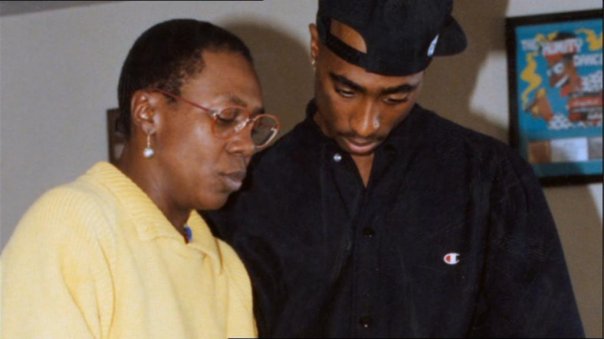The recently deceased Afeni Shakur was born Alice Faye Williams on January 22, 1947 in Lumberton, North Carolina. She moved to the Bronx, NY, when she was just 11 years old and attended the Performing Arts High School in Manhattan as an aspiring actress. In her late teens she was introduced to a man named Shaheed, who introduced her to the principles of the Nation of Islam and people like Malcolm X. The Nation helped to boost her self-confidence and gave her pride in her looks and complexion. She later became a member of the female Bronx collective, the Disciple Deads.
By the age of 19, she was working in a Post Office and decided to join the Black Panther Party with her boyfriend at the time. She felt inspired by the unapologetic Blackness of its members and found role models in the form of people like Eldridge Cleaver. She attended party meetings every Saturday and learned more about the organization’s ten-point program. The man who created a Yoruba village in South Carolina gave her the name Afeni, which means ‘dear one’ and ‘lover of the people.’
In 1968 she became the second wife of revolutionary polygamist Lumumba Shakur, enamored by his ideals and activism. This marriage fell apart when it was discovered that Lumumba was not the biological father of her newborn son Tupac Shakur in 1971. She never publicly addressed who his real father was. She later married Lumumba’s adopted brother, Mutulu Shakur, who was also an activist. Mutulu became one of the most influential male figures in Tupac’s life. This marriage lasted for seven years and produced daughter Sekyiwa a.k.a. “Set.”
During her pregnancy with Tupac, Afeni was incarcerated for participating in an alleged bomb plot during her time in the BPP. During the trial, she acted as her own defense attorney and the jury quickly acquitted her of all charges. Twenty other members were also involved in this alleged plot, including her husband at the time, Lumumba. The case was thought to be part of an FBI-led attempt to neutralize the BPP. After Pac’s birth, she got a job as a paralegal and raised him with an emphasis on education. She believed that Tupac’s work exemplified the principles she learned as a member of the BPP.
In 1986, Afeni and Tupac moved to Baltimore, following the death of Lumumba and the arrest of Mutulu for his alleged part in a robbery. Tupac developed his love of poetry and his social awareness from her. His songs told tales of her struggles with drug addiction, but his unwavering respect and love for her was apparent. A year after his murder in 1997, she used the money from his posthumous albums to start the Tupac Amaru Shakur Foundation, which provides art programs for the youth, and Amaru Entertainment, which took responsibility for all of his unreleased material and developed new artists.
In the early 2000s, Afeni produced a string of films, including Baadasssss Cinema (2002), Tupac: Resurrection (2003) and Fade to Black (2004). By 2007, she won an injunction against Death Row Records and was granted possession of 150 unreleased Tupac tracks, after they failed to prove that the songs were part of their bankruptcy settlement. She also launched the clothing line Makaveli Branded in Pac’s legacy, the proceeds of which all went towards his foundation. She spent her later years making guest appearances and delivering lectures across the States, ever the vocal activist. Her death is thought to be due to a possible heart attack (May 2) and now she can finally rest in power with her baby boy Tupac. RIP Queen.

